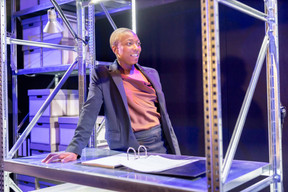The subject is a heavy one, as it involves the issue of rape and its recognition in court. Unfortunately, the news is full of this type of case. “Prima Facie,” written by Suzie Miller (in a French translation by Dominique Hollier and Séverine Magois), tells the story of Tessa Ensler, a young woman from a modest background who, thanks to her talent and hard work, becomes a brilliant criminal lawyer specialising in defending men accused of sexual assault. A master of her craft, she never hesitates to use stratagems to destabilise and discredit the victims, and wins all her cases.
But one evening, her life is turned upside down. After flirting with one of her colleagues, he takes advantage of her. And Ensler finds herself on the other side of the stand. She has the courage to lodge a complaint with the police, but will spend “782 days asserting her rights,” struggling through a procedure that--despite her intimate knowledge of its workings--closes in on her, casting doubt on her story and the absence of consent.
A shift that questions justice
The heart of the play lies in this reversal of the situation and prompts us to question the very foundations of the justice system. Without calling into question the postulates of the law, Miller questions the persistence of questioning victims, of not believing their testimony. “One in three women is a victim of sexual assault,” she has her character declare. “They have to be believed, so that justice can be done.”
The character of Tessa here is played by Céline Camara. The actress delivers a true stage performance, with a monologue lasting over 1 hour 30 minutes, powerfully embodying this woman of acute intelligence and inspiring courage. It’s a demanding role that she makes all the more her own, having initially studied law before devoting herself fully to theatre. In a fast-paced performance, she moves from the role of a brilliant young woman fighting for her career to that of a woman shaken and shattered by rape, but who finds the courage to look her attacker in the eye and go all the way to trial.
It’s also worth highlighting the accuracy of Marja-Leena Junker’s direction and the skill of Christian Klein’s set design. Using very simple elements--three sets of metal shelves, cardboard archive boxes and a few props--they create a scenic space that is both open, subject to the intellectual projection required by the spatial and temporal diversity of the play, and at the same time oppressive enough to reflect an austere and dehumanising organisation. Laurent Peckels’ sound design also supports the monologue without overpowering it, creating a discreet but very present tension.
“Prima Facie” is a play that is a cry against the justice system, so much so that it has changed thinking on the subject in Britain where the play has previously been performed: an English judge told Miller that she had changed the instructions given to juries in rape cases after seeing the play, pointing out that a victim who cannot remember all the details is not necessarily lying. It’s a play that therefore raises that oh-so-sensitive question: is justice really fair?
At the Théâtre du Centaure, 4 Grand Rue in Luxembourg. .
This article was originally published in .




